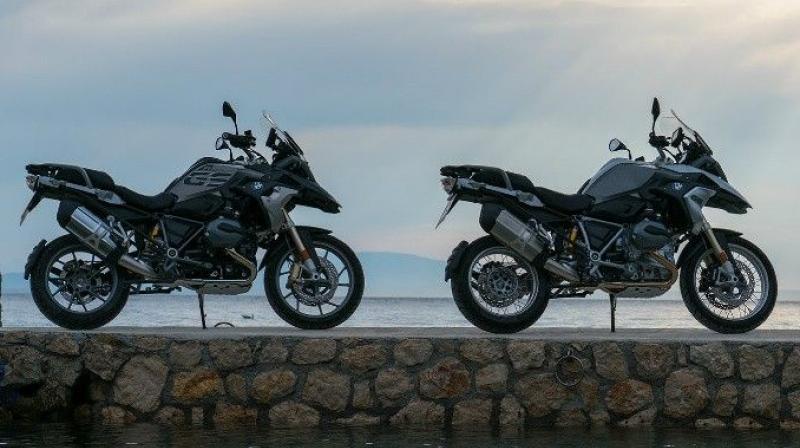First look review of BMW R 1200 GS

The BMW R 1200 GS is one of the most popular adventure motorcycles worldwide. Introduced in 2004, it is BMW Motorrad’s highest-selling motorcycle and currently, it rules the adventure motorcycle segment. The BMW R 1200 GS is a versatile and reliable motorcycle. And the increasing popularity of performance adventure tourer bikes in India has led BMW Motorrad to officially introduce it in the country.
Design:
The styling of the BMW R 1200 GS is unmistakable and in BMW’s own words is ‘a fine balance between form and function’. It has a mass forward design language and the designers have clearly focused their attention on the front-end of the bike. The asymmetrical headlamp looks unique and is among the key design elements of the motorcycle and now they feature LED daytime Running Lights. The stock headlight is halogen, but BMW also offers LED auxiliary lights as an optional extra. The stubby front beak, radiator shrouds, headlamp cowl, chiselled tank are few of the design highlights of the bike.
The massive exhaust muffler, large split saddle and chunky forks endows the bike with an aura of authority. The BMW R 1200 GS will be offered in two versions in India - standard and adventure with the latter featuring spoked wheels, longer travel suspension, larger tank, engine guards and off-road tyres to distinguish itself from the standard bike visually. For the 2017 model, BMW designers have improved the knee area ergonomics for better off-road comfort.
Features:
The bike features a semi-digital instrument console that is easy to read on the go and holds a plethora of information. There is also provision to fix an aftermarket GPS system and socket for power source. Among the most talked about features on the new BMW R 1200 GS is the Hill Start Control system that prevents the rider from rolling back on inclines by means of a targeted intervention in the partially integrated ABS brake system, without the brake lever having to be permanently depressed. When Hill Start Control is activated, the pressure in the rear brake system is built up so that the motorcycle remains stationary on an incline and the rider can touch the ground with both feet.
Semiactive Dynamic ESA suspension is an optional extra in which two sensors register the vertical movements of the wheel suspension and transfer their data to a controller that adapts the damper characteristics to offer plush ride quality. Two riding modes, Rain and Road are standard in conjunction with Automatic Stability Control ASC for optimum traction. It also features Dynamic Traction Control (DTC), dynamic brake light and cornering ABS which come under options. The large windscreen can also be adjusted manually.
Engine:
The biggest update on the 2017 BMW R 1200 GS is the fact that it is now Euro 4 emission norm compliant. The bike is powered by the iconic boxer engine displacing 1,170cc. The air/liquid-cooled motor develops 126.7PS at 7,750rpm and peak torque of 125Nm at 6,500rpm. The mill is mated to a 6-speed transmission and power is sent to the rear wheel via a shaft drive system. To make the engine even cleaner, a new catalytic converter has been added. BMW engineers have also added a judder damper on the transmission output shaft. The adventure tourer bike has also been equipped with ride-by-wire. The new additions to make the bike Euro 4 emission norm compliant has increased the kerb weight of the BMW motorcycle from 238kg to 244kg.
Cycle Parts:
For the bike to handle all the abuses both on and off-road, BMW has equipped the bike with a tubular steel bridge-type frame. The chassis has been designed to offer good rigidity, to handle stress. The engine has been used as a stressed member to ensure a low centre of gravity and improve its handling dynamics. The bike also features a Telelever front fork which has been developed by Sachs specifically for BMW. While a conventional fork’s rake angle and trail decrease as the fork compresses, the Telelever’s rake angle and trail increase as the suspension moves from full extension toward full compression. This system eliminates “fork dive” that is associated with long travel suspension under hard braking.
The “telelever” system can be lucidly put as an “A” arm or “wishbone” that’s been mounted to the sliders just above the wheel. At the back, a Paralever system takes care of damping duties. It is an improved version of BMW’s single-sided rear-suspension technology and decouples torque reaction as the suspension compresses and extends, thereby eliminating the bike’s tendency to squat under braking, reducing tyre chatter. Anchorage is offered by a 305mm dia dual-disc brake clamped by 4-piston radial calipers at the front, while a 276mm dia disc with double-piston floating caliper does duty at rear.
Pricing & Rivals:
BMW has launched both the R 1200 GS and the R 1200 GSA in our two-wheeler market. The base variant of the BMW R 1200 GS retails for Rs 15.9 lakh while the Dynamic+ has been priced at Rs 19 lakh and the top-spec Pro version carries a sticker price of Rs 19.5 lakh. The standard BMW R 1200 GSA retails for Rs 17.5 lakh while the Dynamic+ model has been priced at Rs 20.9 lakh and the Pro variant can be yours for Rs 21.4 lakh (all prices are ex-showroom, Delhi). The BMW R 1200 GS competes against the Triumph Tiger XRA, Triumph Tiger Explorer, Ducati Multistrada 1200 S, Suzuki V Strom and the Kawasaki Versys 1000. However, in our two-wheeler space, the BMW R 1200 GSA competes with the Triumph Tiger XCA and the Ducati Multistrada Enduro.
Source: Zigwheels.com









